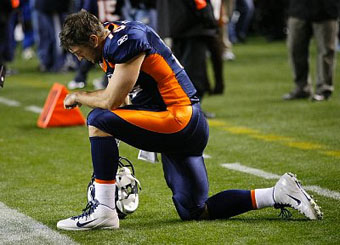
Celebrating True Sportsmanship
| published Monday, November 11, 2013
By Earl Perkins
Thursday Review Associate Editor
The media has been excoriating Tim Tebow because his people trademarked Tebowing—kneeling as though in prayer after scoring a touchdown.
I've never been really big on celebrations and acts that call attention away from games, but you bet I'm glad Tebow backed his handlers' efforts on this occasion. Ask Bill Watterson what he thinks about his favorite cartoon character urinating on just about everything and everybody in the world. Watterson was able to copyright the comic strip Calvin and Hobbes, but has been unable to stop the world making vehicle window stickers showing a smirking child pissing on—Fords, Chevys, Dodges, Bulldogs, Gators, Seminoles—you name it.
What started off as wonderful adventures concerning a mischievous boy and his stuffed animal friend somehow devolved into a sadistic and mean-spirited act perpetrated on others simply because of their choice of product or community. What do you think the world will do to someone who is proud to be a Christian? People around the globe have been mocking Tebow and everything he stands for during his National Football League career. A few short decades ago, he would have been just another young person trying to make his way in life. Besides, Tebow has been doing that move at games since he was a child. In high school, people were moved by his quiet reflections during games, and there wasn't too much blowback when he was quarterback for the University of Florida. But with a spotlight there always comes the microscope.
Some people in the United States say they don't want religion shoved down their throats, but through their negative backlash toward Tebow, they're sending out a message of divisiveness, and worse, rejecting one of the few tools left among athletics which promotes sportsmanship and community.
Some complain that through his brief but overt displays of spirituality, he portrays himself as being somehow better than the rest of the world—or at least of better stock than other players. Still other fans and reporters complain that his little interludes are a stunt, and they just want him to go away.
On the other hand, one could easily make the argument that it's time somebody came along and tried to set a good example for young people, especially in the increasingly narcissistic, mega-money world of athletics—an environment now so obsessed with its cash register potential that sports often eclipse academics and community.
I've been studying the media for decades now—radio, television, magazines, newspapers, etc. Colleges snatch many of these young people out of housing projects, ghettos and lower-middle class neighborhoods from around the nation, promising them an education, stardom and whatever else they want.
The pattern has become all-too-familiar: administrators look the other way when their star players misbehave because those student-athletes bring millions of dollars to their schools. Besides, coaches, team boosters and alumni groups have been paying players for decades—perks such as clothes, cars, cash, and often through not-so-secret channels—with only minimal punishment to the handlers or the coaches. If you know athletes at any major college, just ask them about the bag man. If your scoring totals drop, then you might as well throw away that gratis ATM card. Colleges have their athletic directors and coaches volunteer to join the rules committee, which keeps their team off probation. They don't care about the drugs, alcohol and women for pay. Their primary concern is the all-mighty dollar. When the SEC became the first of several conferences to reach the billion-dollar-per-year mark a few years back (others have since crossed that threshold), college sports entered a realm previously known only to Fortune 500 corporations.
Everything gets even worse when the entitled athletes turn professional. The entertainment component just starts to cost more than it did before, with the media using the time-honored defense that they only reflect “what people want to see.” If this were not the way of the world, then they would be covering stories that help people. Sophisticated readers say there are news stories and then, there are editorials. Please. The New York Times, Washington Post, New York Post, Time, CNN. Writers and the talking heads who read teleprompters often have their own personal agendas they're attempting to foist on an unwitting public.
Those who cover the athletes are also sometimes complicit in perpetuating the problems: when forced by circumstances to shed crocodile tears and espouse phony outrage at player and coach misbehavior, but otherwise enabling a system which encourages the money to continue to roll in unchecked and reaping their own swelling share of the rewards. Would the Richie Incognito affair and the routine hazing and harassment within the NFL be as big a story if it were not for the fact that it exposes political controversy and now attracts higher ratings?
When a society starts dressing its stars like prostitutes and dope dealers, then your country is going to be overrun with whores and dope dealers. Violent crime is steadily rising with no end in sight, even as the money rolls in.
I certainly don’t think that you can blame it on a few of people who choose to take five or ten seconds to reflect upon God or celebrate spirituality during a sporting event.
